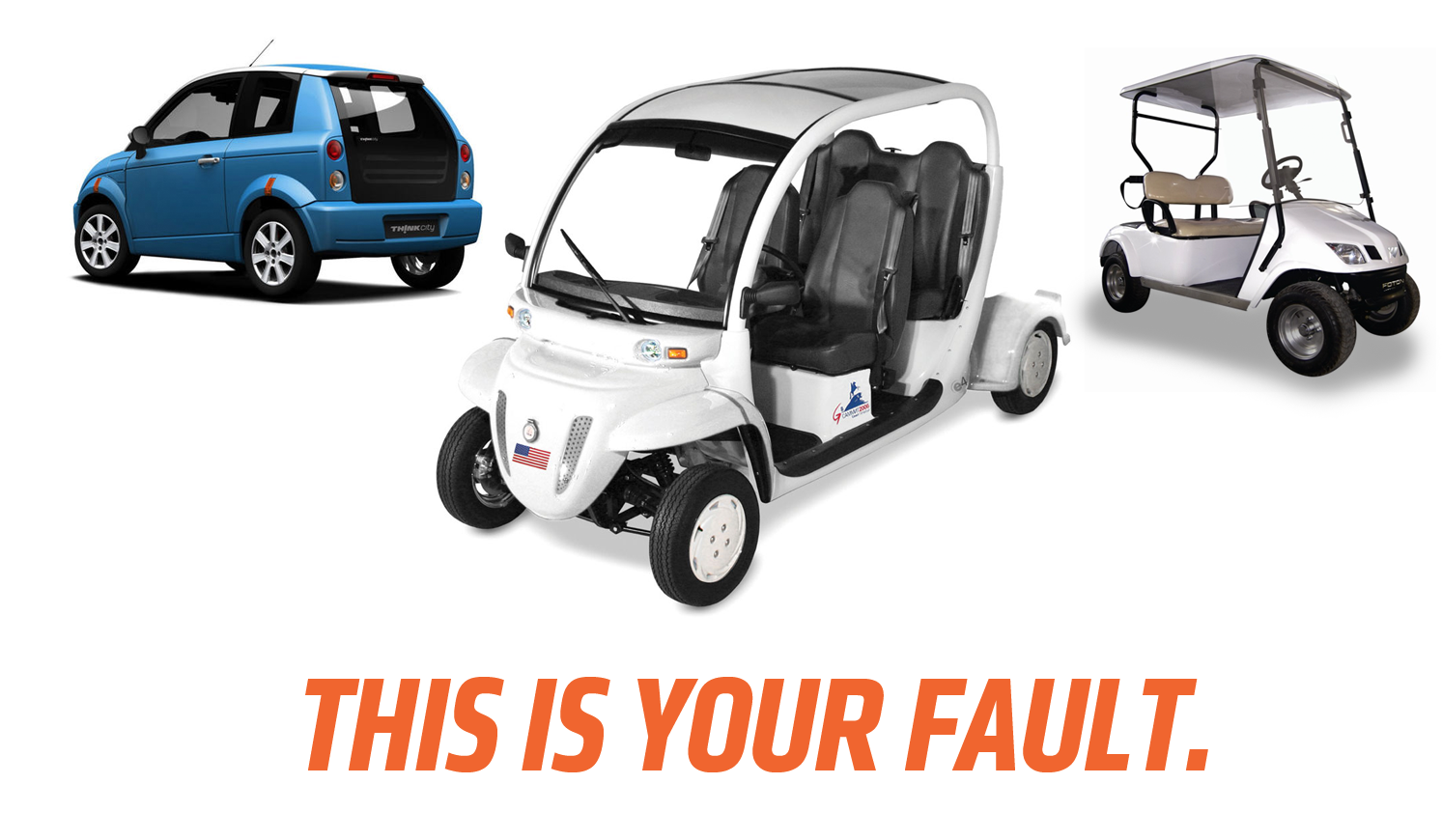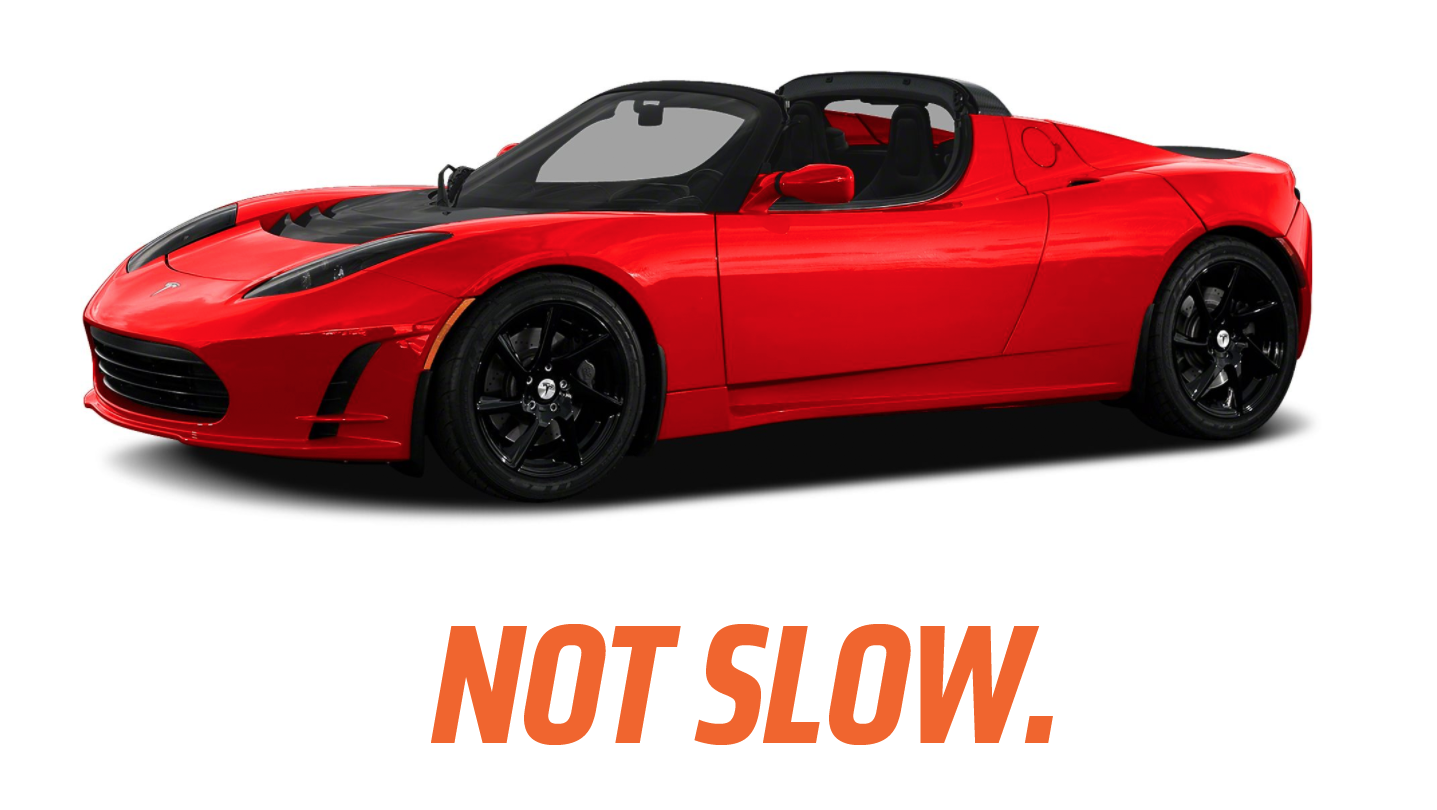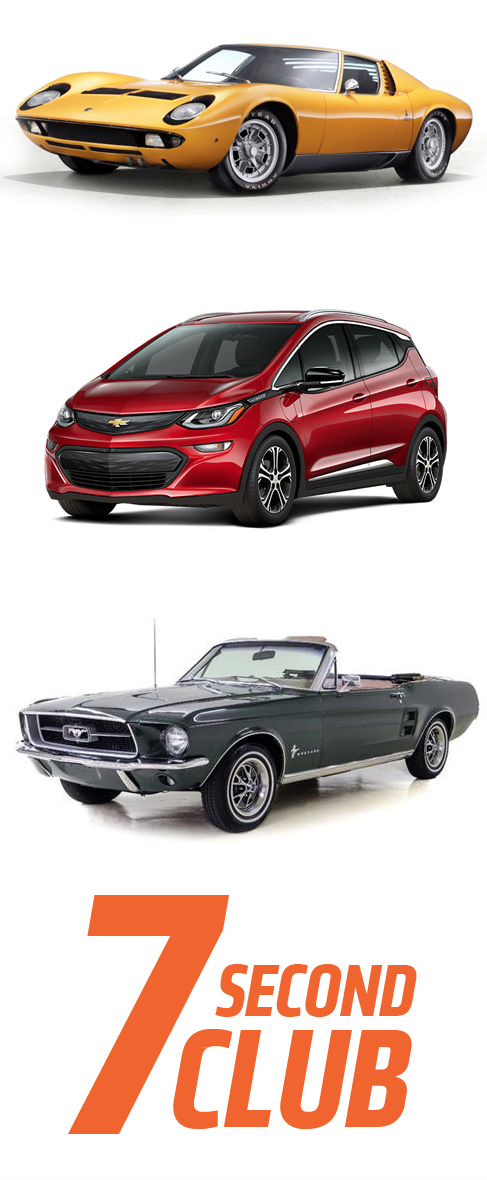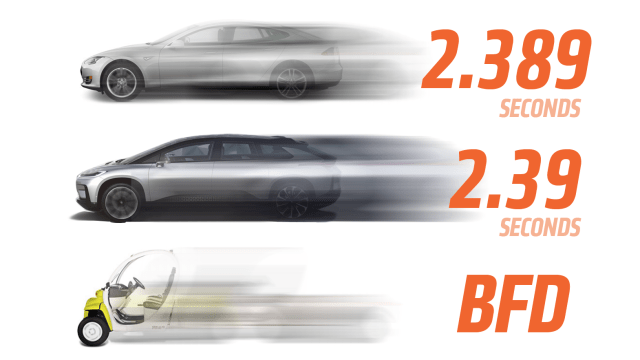When Faraday Future showed off their FF 91 at CES earlier this year, there was really only one number they cared about: 2.39. That’s got nothing to do with the car’s range or anything like that. It’s how many seconds it takes to get to 60mph from a standstill. Lucid made a big deal that their Air could get to 60 mph in 2.5 seconds, and now Tesla says they can do it in 2.389 seconds, a solid thousandth of a second faster than Faraday Future.
This is a dick measuring contest that requires the winner to be decided with a micrometer.
AU Editor’s Note: Yes, this feature from our US cousins over at Jalopnik is lousy with 0-60mph references. 0-100km/h in the currency of our good old fashioned Commodore pushrods and Falcon overhead valves is actually 0-62mph, so takes very slightly longer than the 0-60s quoted here. Still doesn’t change the fact that it’s a silly pissing contest, though. — Cam
You might also remember that Faraday Future, at the very same event where they were showing off how fast their autonomous-capable car could go in a straight line, managed to embarrass themselves when their self-parking demo turned into a demonstration about how their car’s autonomous technology could emulate a panic attack.
I suspect to many people watching, it may have seemed like maybe their engineering team could have spent less time trying to squeeze and extra thousandth of a second from their 0-60 time and more time trying to make the self-parking thing work. Because people who may actually buy this car are far more likely to want it to park themselves than to get it to highway speeds in under three seconds.
The fact remains, though, that at this moment in time, all of the major premium electric carmakers (well, one premium electric carmaker and two wanna-be carmakers) are obsessed with 0-60 times, and it’s a pretty stupid thing to be obsessed with. Also, it’s all Chrysler’s fault.
Now, I know what you’re thinking, partially thanks to the satellites I operate and partially because I’m guessing. You’re thinking, wait – Chrysler doesn’t even have any EVs for sale? Well, they have the Fiat 500e, I guess, but that car hasn’t been involved in any of these 0-60 urinating contests. How can it be their fault?
Here’s how: because they once owned (until 2011, when they sold the division to Polaris) a company called GEM, which made ugly little plastic electric cars that were used as utility vehicles on campuses and zoos and even on public roads as part of NHTSA’s “Neighborhood Electric Vehicle” classification that allowed the vehicles to be used on roads with speed limits of 35 mph or less.

GEM was one of several companies making small, slow electric vehicles in the late 1990s to the early 2000s, vehicles like the TH!NK and the Chinese-made Zap Xebra. For most Americans, these were the first real contact they’d had with electric vehicles outside of a golf course, and, well, they weren’t impressed.
Before Tesla happened, most Americans thought of electric vehicles as slow little wheeled porta-potties that were about as appealing to be seen owning as a cold sore. Specifically, the Lotus-based Tesla Roadster happened, and with a 0-60 time of 3.7 seconds, showed the world that electric could mean sexy and fast.

Tesla pretty much had to make a sexy, fast car for their first car. The biggest hurdle they faced, even beyond battery life and range, was the perception that an electric car is just a slow toy only good for puttering around a neighborhood like a dork.
No matter what Elon Musk says about the Roadster now, it was a huge success in what was likely its most important goal: washing the taste of all those GEMs and ZAPs and TH!NKs out of people’s mouths and brains.
When Tesla released the Model S in 2012, it was far more practical, but remained fast and stylish and desirable. At this point, you’d think the war was won: people now generally understand that an electric motor, with all that torque available right from the start, can make a car very, very quick.
The problem seems to be that electric car makers have somehow not gotten over their insecurity. It feels like they all still think they need to fight the battle against the golf cart perception, and that’s why all these new ‘Tesla-killer’ electric cars are shouting about having 1000 HP and 0-60 times under 3 seconds instead of numbers that actually matter, like range and charging time and how many charging stations there are and how many years their battery packs will last before you’re stuck with a motionless, wheeled sitting room in your driveway.

Speed is fun. Acceleration is really fun. The feeling of getting shoved back in your seat as a car launches forward is fantastic. But if you’re actually planning to buy a car, the difference between getting to 60 in 2.8 seconds and 3.2 seconds or even 5 seconds barely matters. Unless you’re buying the car to drag race (professionally or just for pinks, as a side hustle) the vast majority of people won’t give a brace of BMs if their car takes even 8 seconds to get to 60.
For example, Chevrolet’s new electric car, the Bolt, is staying out of this fight because it takes a whole seven seconds to get to 60. Compared to 2.4 seconds or so that seems glacial, right? You know what else takes around seven seconds to get to 60? A 1973 Lamborghini Miura. A 1998 Acura Integra GS-R. A 2011 Alfa Romeo Spider. A 2012 Audi TT. A 2010 BMW 528i. A 1967 Mustang. Plenty of cars that nobody thinks of as slow.
Because getting from a standing stop to a mile every minute in seven seconds isn’t slow. Sure, getting there in 3 seconds is more fun, but you know what? Five seconds can feel pretty fun, too.
I’m not saying that 0-60 times don’t matter. For some cars, that’s all that matters. But for modern premium electric cars, there’s so much more to worry about and get right, and all this emphasis on 0-60 times over all else just feels stupid.
Range is far more important. Getting everyone to agree on a standard charging cable – this means you too, Tesla – is more important. The time it takes to recharge is more important. The possibility of easy battery swapping is more important. Pretty much every goddamn aspect about owning and using an electric car is more important than how fast it can get to 60.
Plus, all these companies are talking about autonomy, and making that a major push for their futures. Tesla has more semi-autonomous cars in use than anyone else, and Faraday Future staked a whole risky (and failed) demonstration on their autonomous technology.
Once their cars are driving themselves, who are they trying to impress with the 0-60 times? Have they programmed an algorithm that synthesizes that fluttery feeling you get in your gut when you’re behind the wheel of a properly quick car so their robot drivers can feel that too? Have they pioneered the development of the field of Artificial Excitement?
No, they haven’t. When the cars are driving themselves, the people in those cars will want them to accelerate quickly, but not so much that they actually really feel anything, mostly. Because they’ll be doing other things – napping, reading, masturbating, texting, working, whatever – and they won’t be focused on what the car is doing. Otherwise, what’s the point of autonomy?
So, all you premium electric car makers, get a grip. It’s time to grow up. The awful days of GEMs are behind you. Everyone knows you can be quick. It’s time to stop being such insecure weirdos and just relax and try and build some electric cars and related infrastructure we can actually use for a road trip without having to plan it like the Invasion of Normandy.
